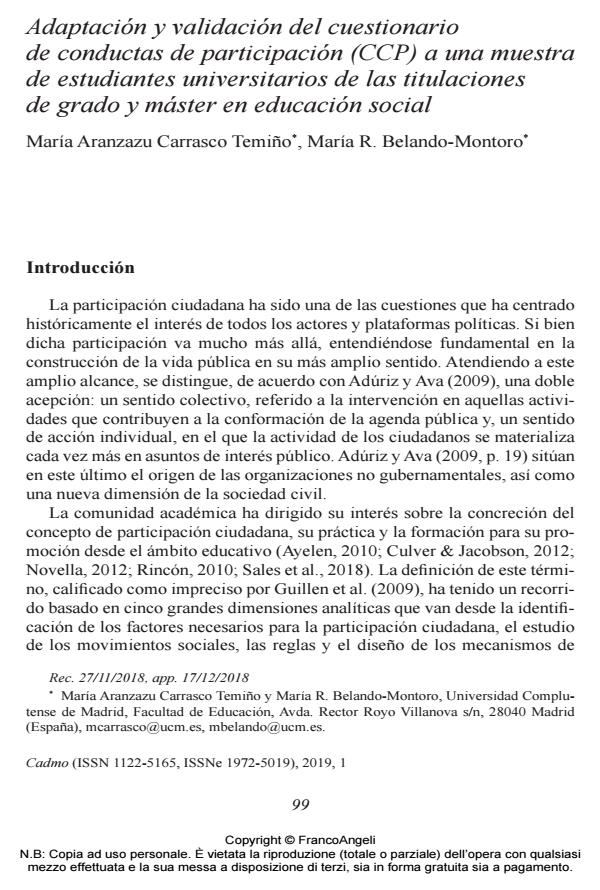Adaptation and validation of the Questionnaire of Participation Behaviors (CCP) to a sample of undergraduate and graduate students in Social Education
Journal title CADMO
Author/s María Aranzazu Carrasco Temiño, María R. Belando-Montoro
Publishing Year 2019 Issue 2019/1
Language Spanish Pages 14 P. 99-112 File size 178 KB
DOI 10.3280/CAD2019-001008
DOI is like a bar code for intellectual property: to have more infomation
click here
Below, you can see the article first page
If you want to buy this article in PDF format, you can do it, following the instructions to buy download credits

FrancoAngeli is member of Publishers International Linking Association, Inc (PILA), a not-for-profit association which run the CrossRef service enabling links to and from online scholarly content.
The objective of this work is to adapt and validate the Participation Behavior Questionnaire (CCP), prepared by Vergara-Lope and Hevia de la Jara (2012), in a sample of Spanish university students of the Degree in Social Education and the Master’s degree in Advanced Studies in Social Education, from the Complutense University of Madrid. To that end, we carried out a lexical adaptation of the questionnaire, because there are differences in the democratic structure of both countries. We collect the questionnaires and we proceeded with a Factorial Analysis of Principal Components with Varimax rotation, to analyze the load of the reagents and the Cronbach’s Alpha Coefficient what assesses the internal consistency. The results show four components similar to the original questionnaire, which respond to the following names: Politics, Participatory, Electoral, Associative-civic. The validation of the questionnaire provides a valid instrument to measure the participation behaviors of young people.
Keywords: Participación, validación, cuestionario, estudiantes universitarios, educación social.
- Redes sociales y otros canales digitales como medios de participación cívica: un estudio cualitativo de la juventud madrileña Juan Luis Fuentes, María R. Belando-Montoro, in Foro de Educación /2022 pp.39
DOI: 10.14516/fde.926 - Participación estudiantil e inclusión digital en la universidad. Un estudio en contextos iberoamericanos María Naranjo Crespo, M. Aránzazu Carrasco Temiño, in Foro de Educación /2022 pp.10
DOI: 10.14516/fde.957
María Aranzazu Carrasco Temiño, María R. Belando-Montoro, Adaptación y validación del cuestionario de conductas de participación (CCP) a una muestra de estudiantes universitarios de las titulaciones de grado y máster en educación social in "CADMO" 1/2019, pp 99-112, DOI: 10.3280/CAD2019-001008